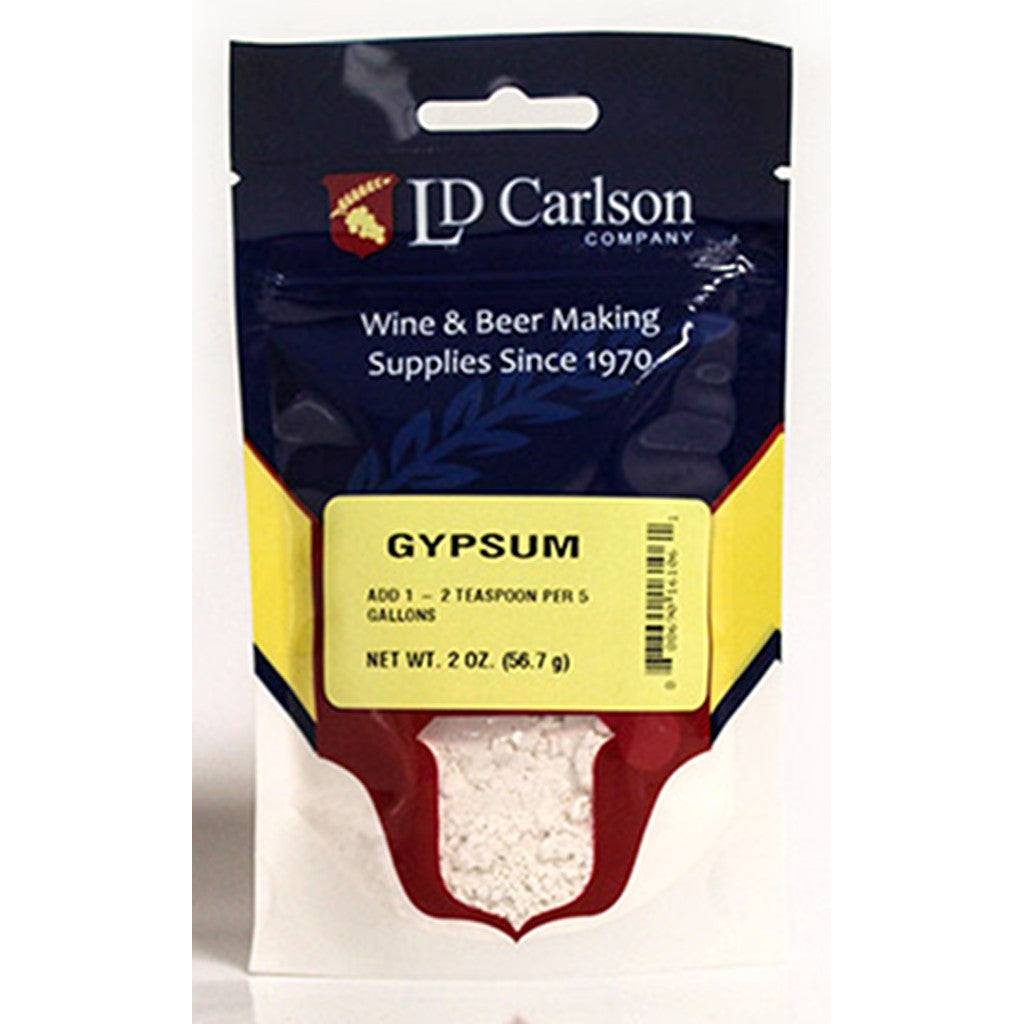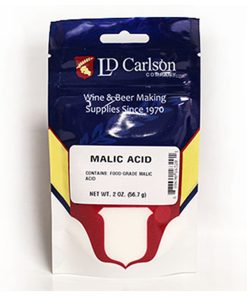Gypsum (Calcium Sulfate), 2oz LD Carlson
$ 1,39 $ 1,00
- Description
- Details
- Directions
-
Gypsum, or Calcium Sulfate (CaSO4), is a naturally occurring mineral commonly used in the brewing process. Gypsum contributes Calcium (Ca2) and Sulfate ions (SO4) which are important to the brewing process and character of the beer. It is generally used in brewing water that is deficient in the these ions or when water adjustment is needed to replicate certain beer styles.
Gypsum also contributes Sulfate ions to beer which play an important role in the overall flavor of the finished beer. Sulfates tend to accentuate the dryness and bitterness of hops and is desired in various styles such as some English ales and German lagers.
Gypsum is generally used to replicate styles of beer which originate from geographic regions with high levels of calcium and sulfate such as Dortmund and Vienna in Germany, Burton in England and Edinburgh in Scotland. Gypsum can also be used in conjunction with Epsom Salts (Magnesium Sulfate, MgSO4). This combination, commonly known as Burton Water Salts, is used when a higher level of Magnesium ions is also required.
Benefits of calcium in the brewing process:
– Regulates mash pH
– Combines with bicarbonate (HCO–3) to form calcium carbonate (CaCO3) to achieve proper beer acidity
– Keeps oxalate salts in solution which can contribute haze and gushing when they precipitate
– Reduces harshness by minimizing the extraction of tannins from the malt
– Assists in protein coagulation during the hot and cold breaks
– Metabolized by yeast and is a necessary element for yeast health and fermentation
– Aids in the clarification of the beer
– Improves the stability of the finished beer -
Ingredients: Calcium Sulfate (CaSO4) Form: Powdered - – Usage varies according to recipe and water supply
– Use approximately 1 to 2 teaspoons per 5 US gallons
– 1 gram gypsum adds 62 ppm calcium and 147 ppm sulfate
Fast Shipping and Professional Packing
We have a range of shipping options thanks to our long-term partnership with UPS FedEx DHL. Our warehouse personnel will pack each item according to our strict specifications. The goods you send us are checked thoroughly and securely secured prior to shipment. Every day, we send thousands of packages to customers across many countries. This is a sign of our commitment to be the largest online retailer globally. Both Europe as well as the USA have distribution and warehouse centers.
Please note that orders with more than one item will be given a processing time according to the item.
Prior to shipment, we will examine thoroughly the items you've purchased. Most orders are shipped within 48 hours. The delivery time should be between 3-7 days.
Returns
Due to multiple entities which include the factory as well as the warehouse, we cannot fully manage stock. So the actual stock may change at any time. Be aware that it's possible that your order could run out of stock even after you've placed your order.
Our policy runs for 30 days. If you have passed 30 days without a trace since the purchase, unfortunately we can't offer an exchange or refund.
In order to be eligible for a refund, your item must be unused and in the same condition as you received it. It should also be returned in the original packaging.
Related products
Home Brewing Ingredient Kits (Ale)
Home Brewing Ingredient Kits (Ale)
Home Brewing Ingredient Kits (Ale)
Home Brewing Ingredient Kits (Ale)
Home Brewing Ingredient Kits (Ale)
Chemicals and Additives
Home Brewing Ingredient Kits (Ale)
Home Brewing Ingredient Kits (Ale)
Home Brewing Ingredient Kits (Ale)
Chemicals and Additives
Chemicals and Additives
Home Brewing Ingredient Kits (Lager)
Home Brewing Ingredient Kits (Ale)
Home Brewing Ingredient Kits (Ale)
Chemicals and Additives
Home Brewing Ingredient Kits (Ale)
Home Brewing Ingredient Kits (Lager)
Home Brewing Ingredient Kits (Ale)
Chemicals and Additives
Home Brewing Ingredient Kits (Lager)
Home Brewing Ingredient Kits (Ale)
Home Brewing Ingredient Kits (Ale)
Cider Ingredient Kits
Liquid Malt Extract
Home Brewing Ingredient Kits (Ale)
Chemicals and Additives
Home Brewing Ingredient Kits (Ale)
Liquid Malt Extract
Home Brewing Ingredient Kits (Ale)
Home Brewing Ingredient Kits (Ale)
Chemicals and Additives
Home Brewing Ingredient Kits (Ale)




































